Interview with Benjamin French, MD, MSc
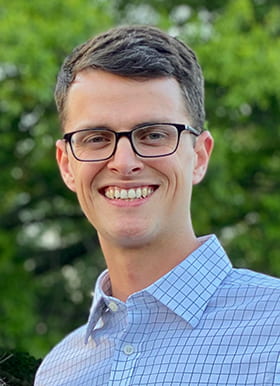
Medical School: Columbia College of Physicians and Surgeons, 2017
Residency: WashU Medicine, 2021
Fellowship in Cardiothoracic Anesthesiology: Brigham and Women’s Hospital, 2022
After graduating, I moved to Boston with my wife where I completed an adult cardiothoracic anesthesiology fellowship at Brigham and Women’s Hospital and stayed on as a member of the absolutely wonderful cardiac faculty at Brigham after graduating. Our daughter (Madeline) was born while we lived there and we spent a few happy years in Boston while my wife completed her two-year minimally invasive GYN surgery fellowship. Once she graduated, we moved to Nashville, TN to be closer to family. I’m now doing private practice cardiac and loving our new city.
WashU’s residency is unbeatable. I went to WashU excited about the fact that we did absolutely every type of procedure and case as residents, knowing that would prepare me for being an attending, and I haven’t been disappointed. You will see it all! Since graduating, what has stood out to me is that folks who train at other places don’t necessarily get this same experience in their training. WashU can provide that for its residents. Do yourself a favor and become the best anesthesiologist you can.
I will pass on some of the great advice I got as I was looking at programs; go to the place you’ll get the best training. Move where you have to. Don’t compromise on your education because what you do and learn in residency is what you’ll be working with for the rest of your career. WashU will make you the best anesthesiologist you are capable of being, whether that means clinical, research, or both. You will be able to go wherever you want after graduating — the WashU name will open doors for you. You will be confident in the OR even when the situation is critical, and you won’t worry that a patient might be served better by another anesthesiologist. Looking back from the other side of things now, I can’t really describe how valuable that is.
Interview with Megan Dewey, MD
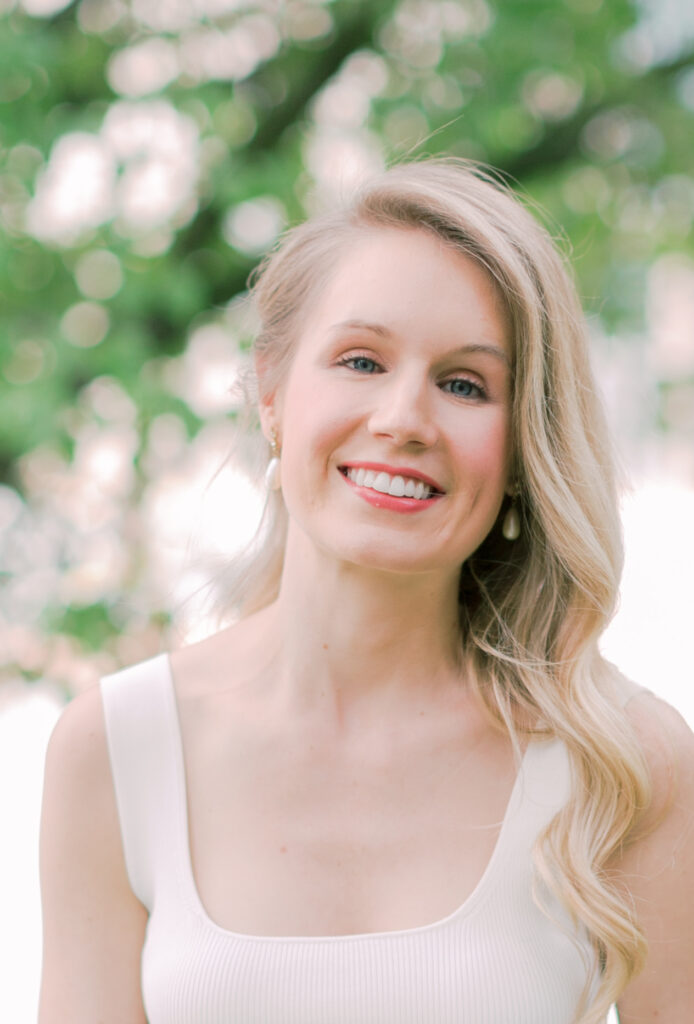
Medical School: Duke University School of Medicine, 2017
Residency: WashU Medicine, 2021
Fellowship in Pediatric Anesthesiology: WashU Medicine, 2022
Since residency, I completed a pediatric anesthesiology fellowship at St. Louis Children’s Hospital and then stayed on as faculty. I work on multiple clinical teams at SLCH including fetal, liver transplant, regional, and cardiac cath lab. My nonclinical responsibilities are primarily education-focused: co-director of the pediatric anesthesia medical student rotation, curriculum research and design, and planning for the Pediatric Anesthesiology Bootcamp. I am also excited to be joining the PSQI initiative on ICU handoff at SLCH!
A primary reason I chose WashU for residency was the depth and breadth of cases I’d perform in training. While I did subspecialize in pediatrics, there’s no doubt that I regularly use my wide knowledge base from four years of high-acuity cases in all types of patients. The independence and clinical decision-making I established as a resident, especially as a senior resident on trauma, allowed me to confidently transition to the fellow and attending roles. Outside of the OR, I had incredible opportunities for leadership and nonclinical work starting as a CA1. Ultimately I am confident these opportunities set me up for success as a chief resident, a fellow, and now as an attending, where work outside the OR continues to be a highly motivating component of my career.
I cannot emphasize enough the importance of finding a program where peers and mentors are considered a fundamentally positive part of the experience. I never felt I faced a challenging scenario (clinical, mental/emotional, or otherwise) without the support of so many around me; the first time I transported a patient from the ICU to the OR, three senior residents showed up to help me. My former co-chief residents remain two of my closest friends with whom I talk almost daily. I still regularly seek advice and perspective from the same mentors I have been lucky enough to know for six years – a role I hope to take on for the next generations of trainees.
Interview with Max Wolfson, MD
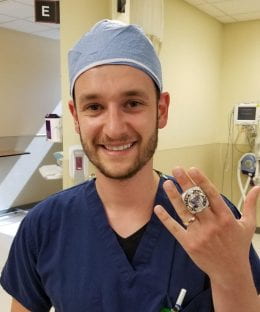
Undergraduate: WashU, 2011, BS Biomedical Engineering
Medical School: WashU Medicine, 2015.
Residency: WashU Medicine, 2019
Fellowship in Regional and Ambulatory Anesthesia: WashU Medicine, 2020
After residency I stayed at WashU to complete a fellowship in regional and ambulatory anesthesia. Our one-year fellowship here gives you over 1,000 ultrasound-guided nerve blocks and a deep experience in acute pain management. After fellowship I was excited to join the faculty at WashU as a regional and general anesthesiologist. Though I never saw myself as an academic anesthesiologist, I found myself enjoying teaching, being able to do a lot of sub-specialty work (regional in my case), and being in a large department with lots of support. Academic medicine includes more than just the research aspect that so many think about, and has a lot of attractive aspects for a recent graduate.
In my case, the transition to practice was quite smooth given my 5 years in the department already. That being said, WashU’s residency was broad, challenging, and nurturing, and I believe it would have set me up for success at most hospitals. It is always easier to scale back on needed skills than to learn new ones on the job. Barnes Jewish and Children’s Hospitals, where you would train as a resident at WashU, attract some of the most complex and varied pathologies, patients, and cases. You will be able to carry forward what you learned here into your practice and not be too scared of difficult patients.
First, I would say pick a residency that gives you a very broad experience. Many big city hospitals suffer from having a high volume in certain fields and shortage in others. This is not ideal for training a resident who needs a great experience in all the fields. It’s a good sign if a program offers most of the anesthesia fellowships. Programs also like to keep their own residents for fellowship so this gives you options later on!
Second, pick a residency where you feel supported both at work and at home. Residency can be tough, so set yourself up for happiness. Cost of living, commute times to all residency rotations, safety around the medical campus, camaraderie of the residents, a non-hostile work and learning environment, and support from the department for other academic pursuits are all valid and important concerns. You should explore these factors at each program. I assure you WashU checks all of these boxes.
Interview with Jasmine Swaniker, MD
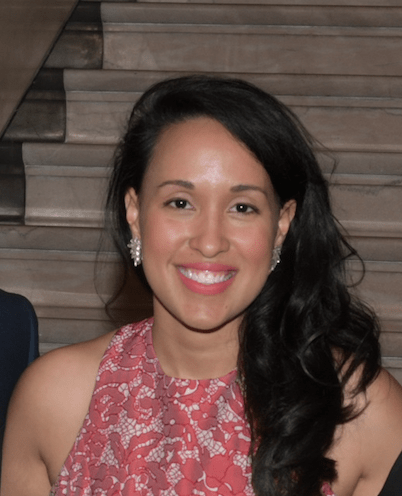
Undergraduate: Duke University, 2009, B.S. Biological Anthropology
Medical School: University of Chicago, 2013
Residency: Washington University in St. Louis, 2017
Fellowship in Critical Care: Washington University in St. Louis, 2018
After residency, I stayed on at Washington University in St. Louis and completed a fellowship in critical care. It was an incredible, but challenging year spent with my favorite attendings taking care of the hospital’s sickest patients. After completing my fellowship, I took a partnership track position with a large private practice group in my hometown of Orlando, Florida.
As is typical with private practice, my day-to-day work life is extremely varied and covers the entire breadth of anesthesia practice. On any given day I could be in the cardiac ORs doing a double valve replacement, in the ortho ORs taking care of pediatric patients and doing nerve blocks, or in the neuro ORs doing a craniotomy for aneurysm clipping. Sometimes that can all happen in one day. My work definitely keeps me on my toes.
My current hospital system’s acuity is very similar to WashU. It is a large, tertiary center that does transplants, VADs, ECMO, and anything else you could imagine. Having trained at WashU has meant that, while I am still learning every day, I never encounter something I have not come across at least once or twice before. Having such a depth of experience to draw from has made the transition to being an attending much smoother and has helped me start off on the right foot with my new group. The excellent clinical exposure at WashU is well known nationally in both academic and community settings and opened many doors for me as I sought fellowship positions and employment. Within a few days of submitting my CV for my current position, a senior partner with the group I was applying to sent me a text offering me an interview. He had heard positive feedback about me from one of my WashU attendings he knew from his time as a WashU trainee.
Even more so than medical school, your choice of residency can have an enormous impact on your career trajectory going forward. Make sure to choose a residency that provides you with a high level of exposure to all subspecialties of anesthesiology, as you will not know what you like until you try it. Come into training with an open mind, and try to see and do as much as you can. Push yourself to take electives and gain exposure in things you do not like as much or do not see yourself doing later on because you never know when those skills may benefit you and your patients down the line. Finally, find the time to build relationships with your co-residents and seek mentorship relationships with attendings. These bonds will help you weather the storms of residency and help sustain you both personally and professionally for the rest of your career.
Interview with Grant Chen, MD
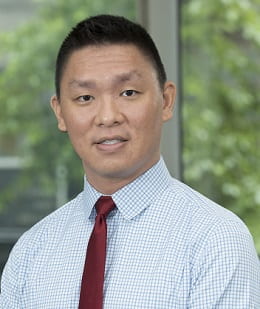
Undergraduate: Rice University, 2004, B.S. Electrical Engineering
Medical School: Texas Tech University, 2011
Residency: WashU Medicine, 2015
Fellowship in Pain Medicine: Hospital for Special Surgery, Cornell University – New York Presbyterian Hospital, and Memorial Sloan Kettering Cancer Center, 2016
After residency, I moved to New York City for an interventional pain management fellowship through three different hospitals: Hospital for Special Surgery, Cornell University – New York-Presbyterian Hospital, and Memorial Sloan Kettering Cancer Center. After completing fellowship, I decided to stay in New York, and I now work for Memorial Sloan Kettering as an attending in interventional cancer pain management. My role includes utilizing my understanding of anatomy to perform various interventions for cancer patients with pain from various tumors, chemotherapy, radiation, etc. I spend some time performing regional anesthesia and manage postoperative inpatient pain as well. I continue to practice anesthesia by providing anesthesia for cancer patients. While I work mostly on my own, I also have the opportunity to teach and supervise rotating residents and fellows from many of the other New York City hospitals.
The residency program at WashU was an excellent stepping-stone toward my career. Barnes-Jewish Hospital has a diverse patient population and offers a wide variety of surgical cases, ranging from routine to uniquely challenging. My experiences during residency prepared me for all the patients and cases I encountered afterward. During fellowship, I met many colleagues who trained elsewhere and had not encountered many of the procedures or cases I had routinely seen at WashU Medicine. Secondly, many faculty members were very helpful in promoting my future, helping me grow professionally and personally. Lastly, WashU Medicine was regarded with respect at all of my post-fellowship job interviews, which helped set me apart from other applicants.
My number one advice for applicants is to find a place that aligns with your future goals. If you are unsure what your goals are at this time, find a place that gives you the opportunity to explore all the options. When I started my residency, I had originally wanted to go into critical care. Luckily at WashU Medicine, we had an enormous amount of exposure to all of the various anesthesia specialties, and I was able to find my true calling in the field of interventional pain management. Find a place where you will get the best training because those four years will define your future. My four years at WashU Medicine really prepared me for the world after residency, and I will always be grateful to my mentors for the excellent quality of my training.
Interview with Satish Reddy, MD

Undergraduate: University of Georgia, 2006
Medical School: Medical College of Georgia, 2011
Residency: Washington University in St. Louis, 2015
Fellowship in Pain Medicine: Washington University in St. Louis, 2016
After residency, I stayed at WashU for a year and completed a pain medicine fellowship. The fellowship offers exposure to a broad range of complex pain conditions and large volume of procedures. After fellowship, I joined a private practice in Nashville, TN, for seven years. It was a change of pace, and I learned a lot during the time. In 2023, I returned to WashU and St. Louis with my family. Since returning, I’ve enjoyed melding experiences in both academic medicine and private practice.
The breadth/complexity of patients allowed me to be comfortable transitioning to independent practice. I felt I had a strong foundation of knowledge and felt comfortable with my procedural skills. Given how busy the large number of pain faculty are, as a resident I got to do many procedures. Without this exposure, I likely never would have considered subspecializing in pain medicine. The large group of faculty also offers a wide range of perspectives on patient care, allowing you to form you own practice style. You will also be surrounded by a diverse and brilliant group of people who will be lifelong colleagues.
Choose a program where you will have good exposure to all the facets of anesthesiology. Look for programs that have strong fellowships in all or most of the subspecialities. Due to my experiences, I certainly walked away from residency in a subspeciality I had no idea I would end up pursuing. Future plans/goals are great to have but keep an open mind.
Four years of residency may seem like a long time, but in hindsight it will seem like a second. Make the most of your time learning from others with such broad experience. Work hard, appreciate the challenging cases (even the overnight urgent cardiac case or transplant), and volunteer for the cases you may not look forward to. You will walk away confident and competent.
Choose a program/location that supports you outside of work. Residency can be hard, optimize your life outside of it. This certainly means different things to different people, but it is definitely important to be mindful of when you choose a program.
Interview with Charlene Blake Swift, MD, PhD
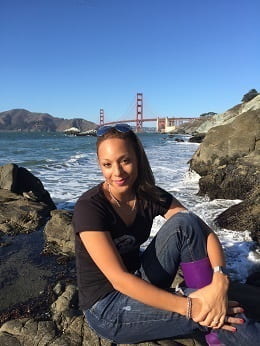
Graduate School: Duke University, 2009
Medical School: Duke University, 2010
Residency: Washington University in St. Louis, 2014
Fellowship in Cardiothoracic Anesthesia: Washington University in St. Louis, 2015
I stayed at Wash U for fellowship in Cardiothoracic Anesthesiology, which was AMAZING since WashU has such a high volume of really sick patients and performs so many heart transplants, lung transplants and ventricular assist devices per year (in addition to all of the other CT cases). After finishing my fellowship, I started as an Assistant Professor at UCSF in the CT Anesthesia division and LOVE my colleagues — I honestly couldn’t be happier! In addition to cardiac and thoracic cases, I also do a mixture of other surgical cases, which is great to keep your general anesthesia skills sharp.
Because of the huge catch area of Barnes-Jewish and the extreme level of acuity of the patients, I felt completely prepared to handle ANY case that came my way as a first-year attending. While fellowship in CT anesthesia also helps to boost one’s confidence and competence, my first awake fiberoptic intubation as an attending (three weeks out of training) was solely from what I learned as a resident. As a prospective trainee, I believe you should look for a program that will challenge you constantly because when you start to feel comfortable as a resident, your learning curve is leveling out– and you need to absorb as much as you can while you are training because sooner than you know, YOU are the one making decisions for the patient whose life is in your hands.
I also honestly believe that I was hired at UCSF (and received offers from other highly regarded institutions) because the name “Washington University in St. Louis” is respected so much in our field. In addition to your personal accolades, your pedigree does matter, and having WashU on your resume boosts your credibility greatly.
Residency is only four years. Go where you will have the absolute best training because it truly does carry you through your career. St. Louis isn’t a bad city to live in– I loved living within walking distance to Forest Park and I was able to buy a house as an intern!
Work HARD. Learn all you can because your patient’s lives actually do depend on it. Yes, it’s a lot of work but this is your time to absorb all you can from different attendings so you can build your own practice style.
Make friends with other residents — in anesthesia and other services. You’ll need a good support system and who better to commiserate with than a colleague?! Plus, they’ll understand your call schedule.
Try your best to have fun while training. You will have days off and there will be times when you’re relieved MUCH earlier than you expected. Therefore, hang out, work out, and take advantage of all that St. Louis has to offer (including being an affordable city near the middle of the country so you can fly almost anywhere in the US in under 4 hours!).